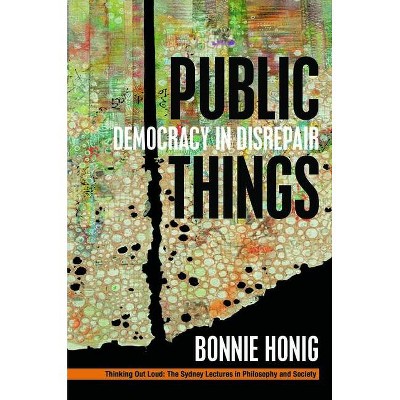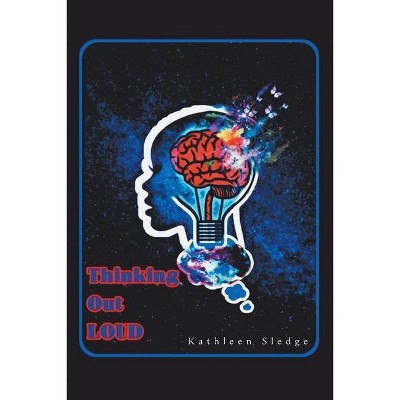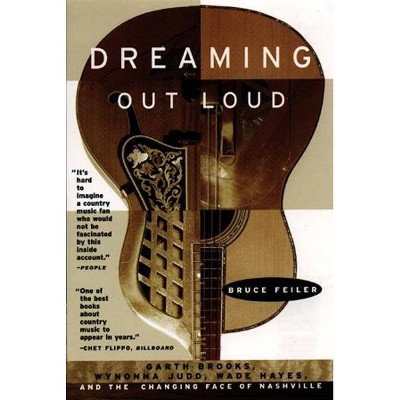Public Things - (Thinking Out Loud) by Bonnie Honig (Paperback)

Similar Products
Products of same category from the store
AllProduct info
<p/><br></br><p><b> About the Book </b></p></br></br>Drawing on Winnicott and Hannah Arendt, <i>Public Things: Democracy in Disrepair </i>develops a lexicon for a political theory of public things. Indigenous activism, racial inequality, and democratic citizenship; care, concern, hope, and play all figure in readings of contemporary events and literary, film, and political theory (Tocqueville, Melville, von Trier).<p/><br></br><p><b> Book Synopsis </b></p></br></br><p>In the contemporary world of neoliberalism, efficiency is treated as the vehicle of political and economic health. State bureaucracy, but not corporate bureaucracy, is seen as inefficient, and privatization is seen as a magic cure for social ills. In <i>Public Things: Democracy in Disrepair</i>, Bonnie Honig asks whether democracy is possible in the absence of public services, spaces, and utilities. In other words, if neoliberalism leaves to democracy merely electoral majoritarianism and procedures of deliberation while divesting democratic states of their ownership of public things, what will the impact be? <p/>Following Tocqueville, who extolled the virtues of "pursuing in common the objects of common desires," Honig focuses not on the demos but on the objects of democratic life. Democracy, as she points out, postulates public things--infrastructure, monuments, libraries--that citizens use, care for, repair, and are gathered up by. To be "gathered up" refers to the work of D. W. Winnicott, the object relations psychoanalyst who popularized the idea of "transitional objects"--the toys, teddy bears, or favorite blankets by way of which infants come to understand themselves as unified selves with an inside and an outside in relation to others. The wager of <i>Public Things</i> is that the work transitional objects do for infants is analogously performed for democratic citizens by public things, which press us into object relations with others and with ourselves. <p/><i>Public Things</i> attends also to the historically racial character of public things: public lands taken from indigenous peoples, access to public goods restricted to white majorities. Drawing on Hannah Arendt, who saw how things fabricated by humans lend stability to the human world, Honig shows how Arendt and Winnicott--both theorists of livenesss--underline the material and psychological conditions necessary for object permanence and the reparative work needed for a more egalitarian democracy.</p><p/><br></br><p><b> Review Quotes </b></p></br></br><br><i>Public Things</i> is a healthy antidote to make a case why things like public schools, spaces, and utilities matter for a healthy democracy. <i>Public Things </i>provides a defense of public institutions, practices, and spaces that transcend the utilitarian calculus of neoliberalism and paves way for a possibly different and more hopeful future.-- "VoegelinView"<br><br>illuminat[es] the need for public things in democratic life when the political economy deprives us of such things. Honig's arguments and lively prose are compelling and make a convincing plea to shift the gaze away from the iPhone towards the fragile public infrastructure--parks, subways, bridges--around us.<b>---Irena Rosenthal, <i>Contemporary Political Theory</i></b><br><br>Although, on the surface, the title Public Things is just a routine translation of the Latin res publica, Honig injects into the phrase a radical twist which exposes the disrepair of contemporary democratic politics. Although upholding the need for publicly shared concerns, her book also launches an indictment: namely, that increasingly such concerns are reified and objectified and thereby transformed into targets for individual or corporate appropriation.-- "Global-E, UC Santa Barbara"<br><br>Public Things like the Postal Service have long been under attack, as political theorist Bonnie Honig powerfully argues in the publication of a series of lectures on democracy in disrepair. Writing against the culture of opting out of public services, spaces, and systems, Honig defends public infrastructures as the things that bind people together, the very things democracy is made of.-- "Urban Omnibus"<br><br>A fast-paced tour de force. Honig explores the role of public things in democratic politics, especially against the background of neoliberal privatization.<b>---John Seery, George Irving Thompson Memorial Professor of Government and Professor of Politics, Pomona College, <i></i></b><br><p/><br></br><p><b> About the Author </b></p></br></br>Bonnie Honig is Nancy Duke Lewis Professor of Modern Culture and Media (MCM) and Political Science at Brown University. She is also Affiliated Research Professor at the American Bar Foundation, Chicago. Her most recent books are <i>Antigone, Interrupted</i>; <i>Emergency Politics: Paradox, Law, Democracy</i>; and, as co-editor, <i>Politics, Theory, and Film: Critical Encounters with Lars von Trier</i>.
Price History
Cheapest price in the interval: 19.99 on November 8, 2021
Most expensive price in the interval: 19.99 on December 20, 2021
Price Archive shows prices from various stores, lets you see history and find the cheapest. There is no actual sale on the website. For all support, inquiry and suggestion messages communication@pricearchive.us



















